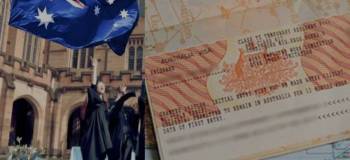With a Student Visa (Subclass 500), you may Study In Australia for up to five years, depending on the degree you choose. The kind of education you choose will determine how long you may remain in Australia.
Read on to find out all the details of the subclass 500 visa!
What are the qualifying requirements for the Student Visa 500 to study in Australia for Indian students?
If you are applying for a student visa (Subclass 500) to study abroad in Australia, make sure you meet the following conditions. Please have the accompanying Student Visa 500 Checklist close at hand and cross off items as you complete them.
- Age Requirements: If you are a student at a school and do not participate in a high school student exchange program, you must be at least 6 years old to apply for the visa. You has to fit into one of the following groups:
- Younger than 17 years old when they begin year 9 of school.
- Younger than 18 years old when they begin year 10 of school.
- Younger than 19 years old when they begin year 11 of school.
- Younger than 20 years old when they begin year 12 of school.
- Passport: Applicants seeking a student visa for Australia must provide a valid passport issued by their current place of residence/birth. A copy of your national ID and driver's licence may also be necessary.
- Biometrics and a recent photograph: You must also provide updated identification photos and biometrics. If the Immigration Office need your fingerprints, they will notify you.
- Student Visa Application Form: The application form for a student visa must be filled out, signed, and sent together with the other relevant papers.
- Evidence of the Study Program: When applying for a study abroad in australia (visa), you must submit a confirmation letter of enrollment (CoE) for each course you intend to take throughout your study term. Your COE must be filed before your visa may be issued. Remember that your COE will expire, and it is your obligation to ensure that you have a valid COE throughout your stay; otherwise, your student visa may be revoked.
- If you are taking more than one study course, you must submit full COE for each course.
- If you do not, your visa will only be valid for that specific study programme.
You may enrol in two or more courses as long as there is at least a two-month break between them and one course leads to the second.
If you fall into one of the following categories, you must submit a letter of support instead of a COE:
- An Australian Department of Foreign Affairs and Trade-sponsored student.
- A student who receives financial assistance from the Department of Defence.
If you are a secondary exchange student, you must complete the Acceptance Advice for Secondary Exchange Student Form.
Postgraduate research students who need to stay in Australia to complete their thesis must produce a letter from their education provider.
- Parental Consent: If you are bringing a kid under the age of 18, and one of the parents is not accompanying the child to Australia, a parental permission form should be included with the visa application.
- Civil Records: You must provide documents such as your birth certificate, marriage certificate, divorce papers, adoption papers, and proof of your connection with a partner. If you have changed your name, you must additionally provide a document proving the change.
- Health Insurance: For their Australia visa application, students must have proper health insurance. Overseas Student Health Cover (OSCH) is required for student applicants and their family members. Students' insurance must be valid from the day they arrive in Australia, not from the start of their studies. Students must get OSHC from an authorised provider and then pay for the insurance coverage; applicants who do not have health insurance may be denied entry into Australia. Students may be excused from health insurance if they meet the following criteria:
- They are Norwegian National Insurance Scheme students.
- Kammarkollgiet covers them as a Swedish student.
- They are Belgian students participating in the Reciprocal Health Care Agreements with Australia.
One who wants to study abroad in Australia must submit an Acceptance Advice for Secondary Exchange Student Form if you are a secondary exchange student.
Postgraduate research students who need to study abroad in Australia to complete their thesis must produce a letter from their education provider.
- Evidence of Financial Capacity: Enough financial resources to pay your travel expenses, one year of living in Australia, and education fees (including money to cover family members). Evidence that family members will financially assist the candidate throughout their studies.
Students living alone during study abroad in Australia are required to have a minimum annual income of AUD 62,222, while students living with other family members must have a minimum annual income of AUD 72,592.
A statement of endorsement from either the Department of Foreign Affairs and Trade or the Department of Defence in Australia is required who want to study abroad in Australia.
- Character requirements: Students who want to study abroad in Australia must adhere to the standards set by the Australian government for good character.
In Australia, a student visa is normally valid for up to 5 years. If your course is shorter, your visa will be valid for the length of your studies.


